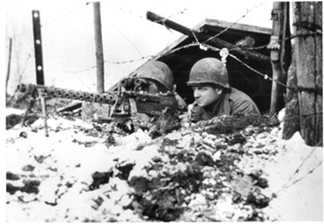Even though we’re dying off at the rate of
more than 1100 WW II veterans a day, there are a lot of us still here
who are qualified to disagree. We are former members of the 70th
Infantry Division, who knew firsthand that the Germans had something
left. After they failed in Bastogne at Christmas, they hit southward
in France on New Year’s Day, 1945, in what they called Operation
Northwind. Our forces collided in the village of Philippsbourg in the
Vosges Mountains of the province of Lorraine.
Philippsbourg didn’t have 100 houses, but
it was a vital spot on the way toward the German target of Strasbourg,
capital city of Alsace. I was a lieutenant in the 275th
Infantry Regiment and 60 years later I share with my comrades the
pride of our role in holding up the German advance. They never got to
Strasbourg.
The village changed hands several times in
fierce house-to-house fighting and several tank battles. We lost a
third of our regiment---1000 men killed, wounded, missing in action,
or sick enough to be evacuated. German losses were even heavier.
 God, how
I hated the snow. It was cruel and favored the enemy. Triggers and
fingers froze in temperatures only a few degrees above zero. The
ground was so hard that the easiest way to dig a foxhole was with
explosives. Soldiers who lived in the holes had their frozen toes turn
black with trench foot.
God, how
I hated the snow. It was cruel and favored the enemy. Triggers and
fingers froze in temperatures only a few degrees above zero. The
ground was so hard that the easiest way to dig a foxhole was with
explosives. Soldiers who lived in the holes had their frozen toes turn
black with trench foot.
Flip Flop About Snow
I have wondered about an army that
prepared me for a winter of snow in France by having me spend a steamy
summer hiking hills in Alabama and Georgia, while ski troops of the
famed 10th Mountain Division trained in the snows of
Colorado, so that they could fight in the mud of Italy.
It was during the post-war occupation of
Germany that I changed my mind about never wanting to see another
snowflake. The army had commandeered recreation facilities in
Garmisch-Partenkirchen and Berchtesgaden in the Bavarian Alps. GI’s
vacationed for $1 a day, room and board included. One attraction was
skiing on the glacier in the huge bowl atop the Zugspsitze, Germany’s
highest mountain. Friends talked me into getting on skis---half again
as tall as I was—with bear trap bindings. I flopped around like a seal
pup on an ice floe. It was marvelous and I was hooked. The family
album shows that I have come a long way since then, at least in
costume. Today, I am color coordinated down to my varicose veins.
Others Followed In The Tracks
Although we long ago gave Garmisch back to
its people, we still maintain a recreation center there for our armed
forces and civilian support groups. Among a half million U.S. visitors
to the town during peak years have been many who also learned to ski
there. As they became more proficient, they gravitated to hundreds of
other possibilities to ski---particularly in nearby Austria and
Switzerland. To resorts such as Davos and St. Moritz in Switzerland,
to Kitzbühel and dozens of other resorts in the Austrian Tyrol.
Snow and sightseeing were two of the
reasons I returned to Europe for three years in the 1950s as a
civilian, working for the U.S. Army sports program and also doing
play-by-play football and basketball broadcasts for the Armed Forces
Network. Weekends and vacations were often spent on the snow.
For a half century since then I have
bumped into many other veterans with similar motivations, skied with
them through blocks of ice on the Vallee Blanche in Chamonix, around
crevasses in Saas-Fee, down the speed course on the Patscherkofel
above Innsbruck. I have glided with them on groomed boulevards that
ran forever, followed them awkwardly in deep powder and crud.
Tenth Mountain Division’s
Contributions
Meanwhile, the guys who went over to
fight, presumably on skis, came home from the war to become major
players in the ski industry. The 10th’s alumni roster
includes many men who deserve to be listed in a skiing “Who’s Who.”
They founded ski areas, most notable among them Vail in Colorado, the
brainchild of combat veteran Pete Seibert. Others directed ski
schools, ran ski shops, made or sold equipment.
The Pennsylvania Ski and Winter Sports
Museum is located at Camelback in the Pocono Mountains, where skiers
can view old skis and boots and memorabilia. The Hall of Fame display
contains biographies of native Pennsylvanians who made major
contributions to winter sports. Eight members of the Hall of Fame
served with the 10th Mountain Division.
It may be difficult to understand how I
can think snow and war and mix pleasant memories with harsh ones. But
nothing I have done since has seemed so important. It was the last of
the “respectable wars,” and it had purpose. The war, as it did for so
many men and women, collapsed the time I needed to find myself.
I was a combat infantryman who managed to
escape what Winston Churchill called “the indiscriminating bullet that
settles everything.” So, I consider my ski adventures to be unearned
bonuses…on borrowed time. I thought about that one day in a graveyard
beside the little church in Neustift, Austria, after an exhilarating
day skiing on the Stubai glacier.
In the cemetery the setting sun squeezed
through grillwork of wrought iron crosses. Lanterns glowed atop some
snow-covered graves. I stopped at a wooden cross with photos of two
young men. They were brothers killed in action in my war, wearing the
wrong uniform.
I whispered to them, "You poor bastards.
You don't know what you've missed."
More by Ted Heck